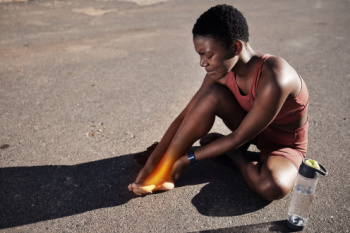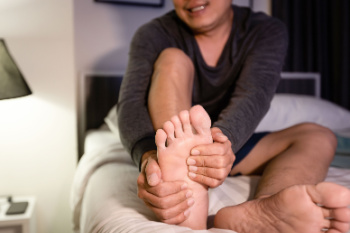Oceanside (760) 630-9200

Foot pain is often dismissed as temporary, but lingering discomfort may signal a deeper problem. Soaking your feet and gently massaging sore areas can offer relief, but persistent pain requires more than home remedies. Simple movements like ankle circles and toe stretches can ease stiffness and improve mobility. Wearing different shoes throughout the week helps reduce stress on certain areas of the foot, allowing tissues to recover. Pain may come from overuse, wearing improper footwear, or hidden conditions such as tendon injuries or nerve issues. Left untreated, these problems can grow worse, making walking difficult and limiting daily activity. Paying attention to what your feet are telling you is key to staying mobile and pain-free. If you have consistent foot pain or if symptoms seem to worsen, it is suggested that you see a podiatrist for an accurate diagnosis and appropriate treatment.
Foot Pain
Foot pain can be extremely painful and debilitating. If you have a foot pain, consult with Dr. Jeff Brooks from Oceanside Foot & Ankle Center. Our doctor will assess your condition and provide you with quality foot and ankle treatment.
Causes
Foot pain is a very broad condition that could be caused by one or more ailments. The most common include:
- Bunions
- Hammertoes
- Plantar Fasciitis
- Bone Spurs
- Corns
- Tarsal Tunnel Syndrome
- Ingrown Toenails
- Arthritis (such as Gout, Rheumatoid, and Osteoarthritis)
- Flat Feet
- Injury (from stress fractures, broken toe, foot, ankle, Achilles tendon ruptures, and sprains)
- And more
Diagnosis
To figure out the cause of foot pain, podiatrists utilize several different methods. This can range from simple visual inspections and sensation tests to X-rays and MRI scans. Prior medical history, family medical history, and any recent physical traumatic events will all be taken into consideration for a proper diagnosis.
Treatment
Treatment depends upon the cause of the foot pain. Whether it is resting, staying off the foot, or having surgery; podiatrists have a number of treatment options available for foot pain.
If you have any questions, please feel free to contact our office located in Oceanside, CA . We offer the newest diagnostic and treatment technologies for all your foot care needs.

Plantar fasciitis is a common cause of heel pain, especially in active adults or those who are on their feet for long periods. It develops when the thick band of tissue along the bottom of the foot becomes inflamed. Treatment often begins with rest and stretching exercises to reduce strain on the fascia. Supportive footwear and custom orthotics can help redistribute pressure and prevent further injury. In some cases, night splints or anti-inflammatory medications may help. More persistent cases might benefit from shockwave therapy or corticosteroid injections. Surgery is rarely needed but is available for severe, long-standing pain that does not improve. Early care makes a significant difference in recovery time and overall outcome. If you have ongoing heel pain that may be plantar fasciitis, it is suggested you see a podiatrist for a diagnosis and appropriate treatment.
Plantar fasciitis can be very painful and inconvenient. If you are experiencing heel pain or symptoms of plantar fasciitis, contact Dr. Jeff Brooks from Oceanside Foot & Ankle Center. Our doctor can provide the care you need to keep you pain-free and on your feet.
What Is Plantar Fasciitis?
Plantar fasciitis is the inflammation of the thick band of tissue that runs along the bottom of your foot, known as the plantar fascia, and causes mild to severe heel pain.
What Causes Plantar Fasciitis?
- Excessive running
- Non-supportive shoes
- Overpronation
- Repeated stretching and tearing of the plantar fascia
How Can It Be Treated?
- Conservative measures – anti-inflammatories, ice packs, stretching exercises, physical therapy, orthotic devices
- Shockwave therapy – sound waves are sent to the affected area to facilitate healing and are usually used for chronic cases of plantar fasciitis
- Surgery – usually only used as a last resort when all else fails. The plantar fascia can be surgically detached from the heel
While very treatable, plantar fasciitis is definitely not something that should be ignored. Especially in severe cases, speaking to your doctor right away is highly recommended to avoid complications and severe heel pain. Your podiatrist can work with you to provide the appropriate treatment options tailored to your condition.
If you have any questions please feel free to contact our office located in Oceanside, CA . We offer the newest diagnostic and treatment technologies for all your foot and ankle needs.






